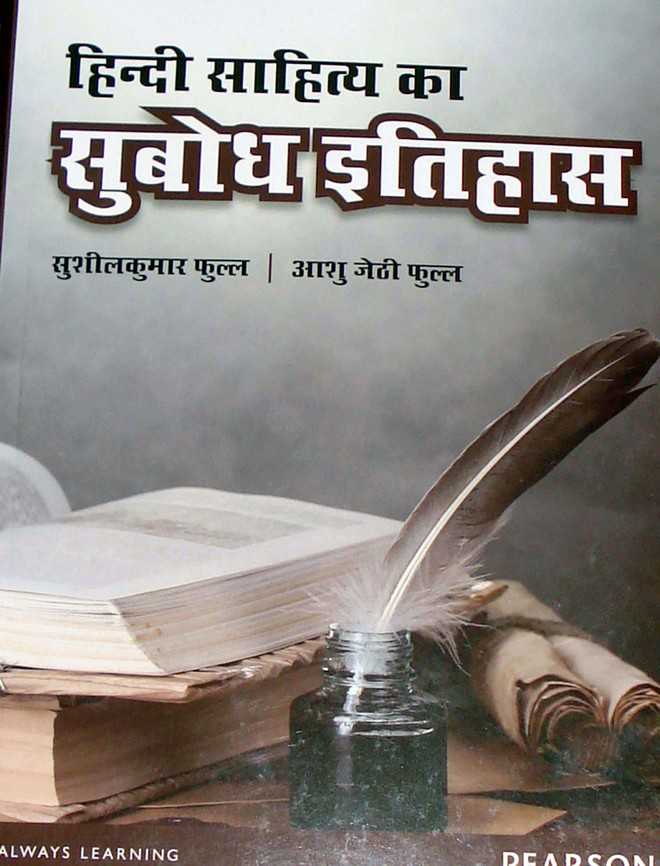Shriniwas Joshi
A peculiar combination of father-in-law Sushilkumar Phull and daughter-in-law Ashu Jethi Phull, both residents of Palampur, has brought out a book on the history of Hindi literature (see photo). I had first purchased a book on the history of the Hindi literature by Dr Nagendra in 1976 for Rs 60 only, the second book by Dr Shiv Kumar Sharma in 2004 for Rs 100 and the present one published by Pearson costing Rs 500 has been gifted to me by the authors. I am mentioning only three, but there are innumerable books on the subject. What was the necessity of having one more in the queue? I can give three reasons for that. — First is that the constant development of literary consciousness and continuing research on literature need to be docketed.
Although the basic standards of any literature do not change much, yet the perception of the changing times and change in the technical processes influence the history of literature, so a new book. Secondly, literature is dynamic and always adds new concepts, new theories, new hypotheses and new authors and writers to its fold, which deserve a place in the history. And thirdly, ignoring the standardised works of the writers of small states like Himachal Pradesh by the mainstream writers or disregarding their contribution towards any new thought leads to a new book on the history bringing forth the contribution of the small state litterateurs.
In support of the third reason, the authors have projected Sushilkumar Phull as the originator of “sahaj kahani” – innate story – whereas the other two books, cited above, are silent about it. The book carries the names of many local writers and their works, thus filling the existing hiatus in the inclusive history. Hariram and RC Khatta’s histories existed earlier, but were Himachal exclusive.
Sushilkumar Phull is a prolific writer with more than 50 books to his credit and has earned several awards, including the academy and the state ones, for his creative writings. Ashu Jethi teaches Hindi in a government college and has done doctorate from the Panjab University on “Women considerations in Himachali novels”. I confess that I have never met her nor read any of her creative works.
The Hindi literature is divided into four major periods, viz “Adikaal” (early period) from the 7th to the middle of the 14th century; “Bhaktikaal” (devotion period) from the middle of the 14th to the middle of the 17th century; “Ritikaal” (mannerism period) from the middle of the 17th century to the middle of the 19th century and the modern period from the middle of the 19th century to date. The present book has the lacuna of not depicting the “Bhaktikaal” as a separate period but is submerged in the early period (page 20 of the book), which, I think, is through overlooking.
My readers may not show interest in the nitty-gritty of the history, but they would like to know who the first poet of Hindi literature was. A few historians believe that Shalibhadra Suri, who had written “Bharateshwar Bahubali Raas” in 1184 was the first poet of Hindi literature. The others believe that Sarahpaad, who was born between 797 and 826 CE, was the first poet who had written 32 literary treatises. Phulls have thrown themselves on the second version saying that “Doha Kosh” was his magnum opus.
I come to the dramas now. While the contention of Dr Shiv based on the research by Dr Dashrath Ojha is that the first Hindi drama “Gaay Sukumaar Raas” was written in 1289, the present book asserts that “Nahush” by Gopalchandra, father of Babu Harischandra, was the first drama written in 1814. I believe that this drama was never staged and remained an armchair read. The first Hindi play that was staged at Purana Naachghar in Varanasi was “Janaki Mangal” on April 3, 1868, in which Babu Harischandra played the role of Lakshmana.
The book by Sushil and Ashu is worth the money and should be in the shelf of every book lover, especially the Hindi lovers cannot ignore this excellent work done by the duo which covers the Himachali writers too.
TAILPIECE
A country that does not take pride in its language and literature can never progress.
— Dr Rajendra Prasad
—The writer is a retired bureaucrat.
Unlock Exclusive Insights with The Tribune Premium
Take your experience further with Premium access.
Thought-provoking Opinions, Expert Analysis, In-depth Insights and other Member Only Benefits
Already a Member? Sign In Now










